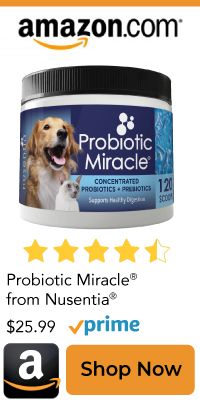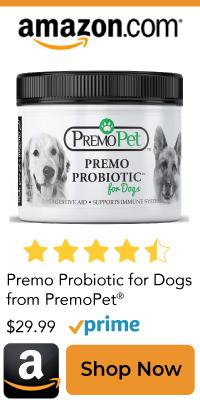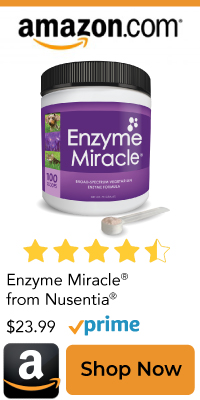Are probiotics just for sick dogs?
No. All dogs should be given probiotics daily as an essential supplement. Probiotics are as important as vitamins and should be taken daily. Your dog’s gut is his primary immune system engine, by supporting the gut with probiotics, your dog will have the benefit from better digestion, better skin and coat
, and better overall health.*
How do probiotics help my dog?
Probiotics, also known as ‘friendly bacteria’ are essential to every healthy immune and digestive system. By supplementing your dog’s food with a probiotic supplement, you help to increase the levels of friendly bacteria and crowd out bad/unhealthy bacteria which can cause illness and malnutrition. The best probiotic supplements contain highly stable species (strains) of probiotics which are proven to pass through the stomach acid and implant in the intestine. These strains have been researched to be beneficial specifically for dogs and cats.
Probiotics for Pets: Understanding CFU and Dosage
How long does it take for probiotics to work in dogs?
Every dog is different. Some dogs respond in a day or two, and others may take up to 6 weeks with regular use. If you're not seeing improvement by a few weeks, you may have the wrong product or you may need to change your dosage.
Top Sellers in Dog Probiotics
Will my dog like the taste of the probiotics on the dog food?
The best probiotics for dogs are powders. These powders should not have unneccessary ingredients, neither should there be any flavor or fillers, making the serving size tiny. If you're serving up a pure probiotic powder, it is likely that your dog will not even detect the probiotics on the food.
Are there any side effects of giving my dog probiotics?
Probiotics have no known negative side effects, it is considered a holistic supplement. Also there is little to no risk of over-supplementation.
Will probiotics have any negative interaction with other medications?
It is safe to take a probiotic supplement with most medications. There are no known drug interactions with probiotics. However, if your dog is on antibiotics, we recommend waiting until antibiotic therapy is over before continuing with probiotics.
Read: Your Dog Is On Antibiotics, What Do You Do Next?
Can I give probiotics to my puppy?
YES! Because your puppy has a developing immune system, probiotics are especially recommended during your dog's first 2 years of life. By doing this, you will help to support his body against developing allergies and other digestive
and immune conditions.
Read more about probiotics for puppies
Is it necessary to refrigerate probiotics for my dog?
This depends on the product. Our understanding is that a stable powder formula should not require refrigeration to maintain label claim potency, however, refrigeration can help to preserve the viability of the bacteria for a longer period of time. If you do refrigerate probiotics, be sure to keep the lid closed tightly and avoid moisture developing in the canister which can mess with the efficacy of the probiotics.
What should I expect after I start my dog on probiotics?
Every dog is different and will react differently. However, we've put together s a week by week description of what typically happens to your dog's body when probiotics are introduced. Read More.
What is FOS Inulin Fiber?
Prebiotics, such as FOS, are an important ingredient in any good probiotic supplement for dogs. FOS, or inulin fiber, is the most common, but there are others.

7 Signs Your Dog Needs Probiotics
If your dog is showing some of these symptoms, chances are he needs probiotics and digestive support.

Are Probiotics Safe for Puppies?
Probiotics are highly recommended for puppies and young dogs, here's why...
Cites and References
- Grześkowiak Ł, Endo A, Beasley S, Salminen S. Microbiota and probiotics in canine and feline welfare. Anaerobe. 2015;34:14-23. doi:10.1016/j.anaerobe.2015.04.002
- Gómez-Gallego C, Junnila J, Männikkö S, et al. A canine-specific probiotic product in treating acute or intermittent diarrhea in dogs: A double-blind placebo-controlled efficacy study. Vet Microbiol. 2016;197:122-128. doi:10.1016/j.vetmic.2016.11.015
- Coman MM, Verdenelli MC, Cecchini C, et al. Probiotic characterization of Lactobacillus isolates from canine faeces. J Appl Microbiol. 2019;126(4):1245-1256. doi:10.1111/jam.14197
- Pilla R, Suchodolski JS. The Role of the Canine Gut Microbiome and Metabolome in Health and Gastrointestinal Disease. Front Vet Sci. 2020;6:498. Published 2020 Jan 14. doi:10.3389/fvets.2019.00498
- Peng Y, Shi Q, Wang Y, Zhang F, Ji Z, Zhang J. Dietary probiotics have different effects on the composition of fecal microbiota in farmed raccoon dog (Nyctereutes procyonoides) and silver fox (Vulpes vulpes fulva). BMC Microbiol. 2019;19(1):109. Published 2019 May 24. doi:10.1186/s12866-019-1491-x
- Vilson Å, Ramadan Z, Li Q, et al. Disentangling factors that shape the gut microbiota in German Shepherd dogs. PLoS One. 2018;13(3):e0193507. Published 2018 Mar 23. doi:10.1371/journal.pone.0193507
 Probiotics for dogs: Probiotic Miracle
Probiotics for dogs: Probiotic Miracle Probiotics for dogs: Premo Probiotic
Probiotics for dogs: Premo Probiotic Enzymes for Dogs: Enzyme Miracle
Enzymes for Dogs: Enzyme Miracle